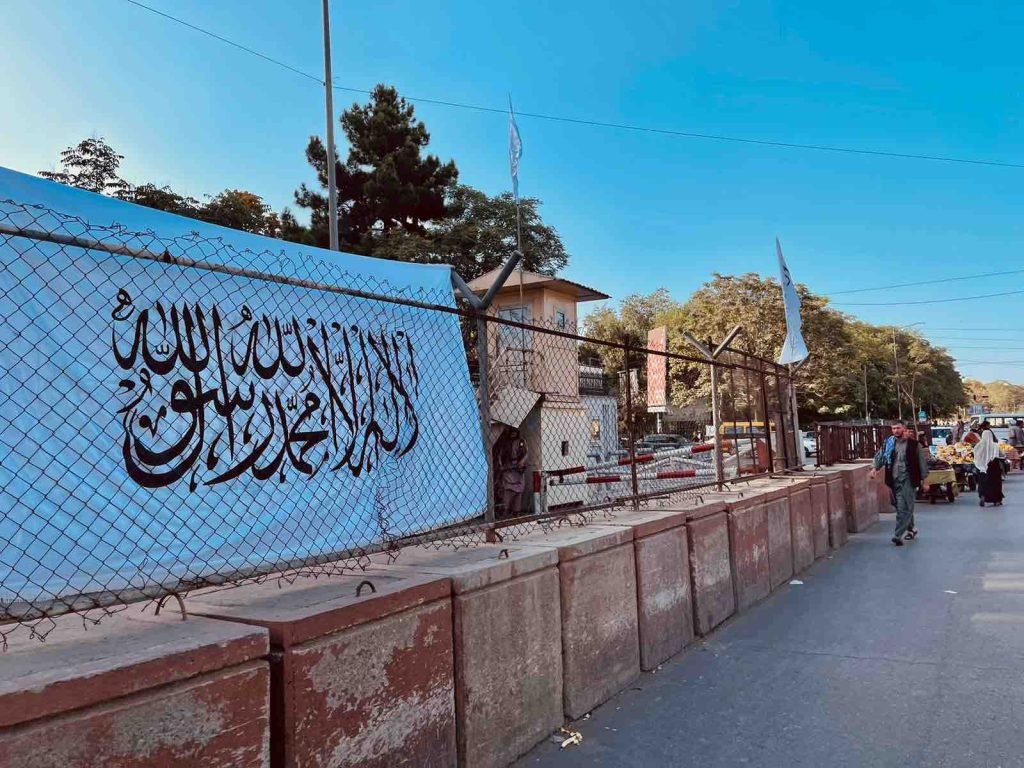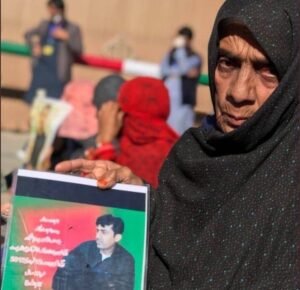The Enigmatic Leader of the Taliban: Fact or Fiction?

In the heart of Kabul: The Taliban flag bearing the Islamic declaration 'There is no God but Allah, and Mohammad is the messenger of Allah.' 🇦🇫 #Kabul #Taliban Photo: @AADIL
By Ilhamuddin Afghan
In recent years, Afghanistan has witnessed a transformation of unprecedented proportions, with the Taliban once again emerging as a dominant force in the nation’s complex landscape. Amidst these shifting tides of power and influence, the enigmatic figure of Mullah Haibatullah Akhundzadah has garnered significant attention. Rumors, speculations, and myths surrounding his existence and role within the Taliban have shrouded the leader in a cloud of mystery.
For quite some time now, reports have been circulating through various media channels, particularly social media, suggesting that Akhundzadah has been making appearances at institutions and even venturing into different provinces. These reports have raised one fundamental question: Does Akhundzadah genuinely engage with the Afghan people? Who is meeting people under the name of Akhundzadah? Does he really exist? Various interpretations and views regarding his existence have fueled this debate, both within Afghanistan and beyond.
The overarching skepticism of the Afghan population persists, with many questioning whether a leader genuinely exists for a group that now exerts significant control over Afghanistan. This skepticism is not limited to private conversations but is also a topic of discussion in the media. Various opinions have emerged to address this uncertainty. Some Afghans contend that Akhundzadah is a fabricated name, asserting that no individual by that name exists. They argue that the creation of this persona serves to maintain unity among Taliban supporters and those who facilitated the group’s rise to power.
Conversely, alternative theories propose that a member of the Pakistani army, bearing the name HaibatullahAkhundzadah, has been appointed as a puppet leader to issue orders and edicts to the Taliban. The controversy deepens as some argue that they have seen the leader themselves or had personal interactions with him. These claims are often made in private gatherings, sparking further questions about their veracity. It is suggested that some Taliban members may be motivated to project the image of a leader, someone responsible for issuing decrees and overseeing the administration. The belief is that this may be a strategic move to bolster public perception of the Taliban leadership.
This enigmatic narrative is further complicated by instances where news reports have claimed Akhundzadah‘s presence in various provinces. Reports from Kandahar indicate his visit to a large hospital in Ainu Mena, during which he purportedly met with doctors and patients. Another report suggested his trip to Uruzgan province, where he met with local officials, offering recommendations and guidance. In addition, there were reports from last year of Akhundzadah’s appearing at a gathering of Mullahs in Kabul. These reports described an event where he spoke to the participants without revealing his face, with rumors even suggesting that he turned his back to the audience.
This complex narrative becomes even murkier as different Taliban members and sympathizers claim in private meetings to have had encounters with Akhundzadah either through meetings or receiving direct instructions from him. However, the accuracy of these claims remains questionable. Skepticism persists regarding whether these interactions were genuine or merely attempts to project the existence of a Taliban leader.
Akhundzadah: A Taliban Hidden Leader
The central question surrounding this narrative is: Why is Akhundzadah concealed from the public eye? Some believe that the secrecy surrounding him may serve as a strategic tool to emphasize his symbolic role in the Taliban’s victory over the U.S. and its allies, portraying him as an unwavering hero who cares for people. Yet this enigma leaves many puzzled. If the Taliban have indeed brought stability and security to Afghanistan, as they claim, why would their leader remain hidden from public view?
“It seems as though a Pakistani colonel is issuing decrees in the name of a deceased Taliban leader whose identity and life are shrouded in uncertainty,” social activist Baz Mohammad Gran expressed his concerns.
Karim Khan, another social activist, has also voiced his doubts, challenging the Taliban’s policy of disseminating statements under the name of Akhundzadah. Khan wonders, ‘Why don’t they give his voice to prove he exists? It’s confusing since his followers never inquire as to whether Akhundzadah is young or old, living or dead, or even if he is capable of speaking. The mystery surrounding Akhundzadah continues to be perplexing to Afghans.”
Furthermore, the absence of concrete information about Akhundzadah‘s family and children has only deepened the mystery. While some details about his background have been published in various media outlets, much of his life remains in obscurity. As per these reports, Akhundzadah is around 63 years old, hailing from Panjawai district in Kandahar. He is identified as a Pashtun from the Noorzai tribe and received his education in religious schools in Pakistan. He previously served as the deputy to former Taliban leader Mullah Akhtar Mansour, culminating in his role as the group’s judge during the final years of the Taliban’s previous rule between 1996 and 2001.
Mystery Surrounds the Taliban Leader’s Legitimacy
The ambiguity surrounding Akhundzadah’s identity and leadership role has also sparked discussions about his prior position as the Taliban’s chief judge. Some Afghans question whether the current Taliban leader is the same Akhundzadahwho held that role during the Taliban’s previous rule.
This lack of transparency extends to the core of Akhundzadah‘s leadership. In history, Islamic leaders have typically demonstrated a deep sense of responsibility towards their people, providing essential services and showing compassion. The prevailing perception among the general public is that the leader of the Taliban has yet to fulfill the role of a genuine Islamic ruler. Skepticism arises as he continues to issue decrees and directives with his true identity concealed.
This secrecy has also raised concerns about his leadership’s legitimacy. According to Islamic law, mentioning the name of a Muslim leader in a Friday sermon is not permissible if individuals have not sworn allegiance to the leader face-to-face. Such a fundamental aspect of religious protocol has led many to question whether Akhundzadah can be considered a legitimate leader if no one has personally witnessed his leadership.
In conclusion, the mysteries and doubts surrounding Akhundzadah’s existence and role as the leader of the Taliban reflect the complexities and enigmas of the group’s rule in Afghanistan. While some maintain that his concealed presence serves a strategic purpose, others question the legitimacy of his leadership and whether he truly represents the interests of the Afghan people. Until these mysteries are unraveled, Akhundzadah will remain an enigmatic figure in the landscape of contemporary Afghan politics.
Ilhamuddin Afghan is a university professor based in Afghanistan.
Note: The contents of the article are of sole responsibility of the author. Afghan Diaspora Network will not be responsible for any inaccurate or incorrect statement in the articles.











